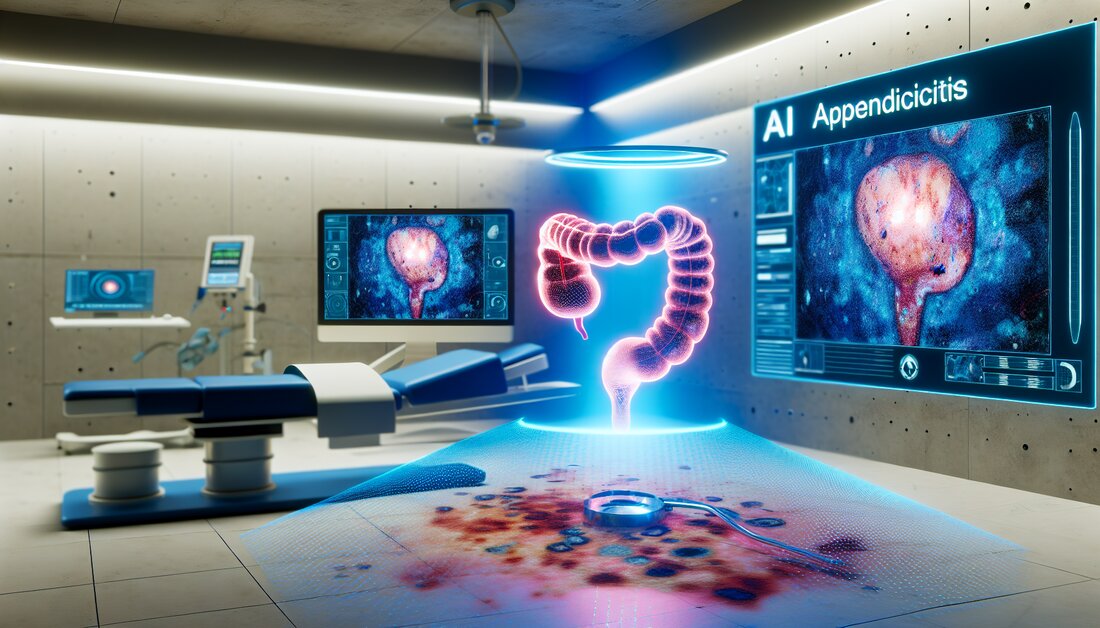LesionScanNet: Artificial intelligence revolutionizes appendicitis diagnosis with 99% accuracy
LesionScanNet: A lightweight, robust CNN for detecting acute appendicitis with 99% accuracy tested on 2400 CT images. Versatile in medical applications. 🚀 #AI #Medicine

LesionScanNet: Artificial intelligence revolutionizes appendicitis diagnosis with 99% accuracy
The research offers new insights into the diagnosis of acute appendicitis, a sudden inflammation of the appendix that causes symptoms such as abdominal pain, vomiting and fever. Computed tomography (CT) is often used for diagnosis, but this can be difficult due to the location of the appendix and the complex anatomy of the colon. A new tool called LesionScanNet has been developed to help radiologists accurately detect this condition.
LesionScanNet is an advanced model based on a deep neural network, more specifically a convolutional neural network (CNN). This model analyzes CT images to detect signs of appendicitis with high accuracy. To develop the model, 2400 CT images were collected, which provide a solid basis for training the network. Impressively, the model achieved an accuracy of 99% in appendicitis detection on test images - a result that even surpasses market-leading models.
The potential impact of this development could be significant. Using such a powerful model could make the diagnosis of appendicitis more precise and faster, which in turn could lead to more efficient treatment. As this tool develops further, it could potentially be used in other medical areas, making it a versatile tool in diagnostic imaging.
Basic terms and concepts
- Akute Blinddarmentzündung: Eine schnelle Entzündung des Wurmfortsatzes (Appendix) mit Symptomen wie Bauchschmerzen und Fieber.
- Computertomographie (CT): Ein medizinisches Bildgebungsverfahren, das Querschnittsbilder des Körpers liefert, um Krankheiten und Verletzungen zu diagnostizieren.
- Convolutional Neural Network (CNN): Eine Art von künstlichem neuronalen Netzwerk, das besonders gut bei der Analyse von Bilddaten ist.
- LesionScanNet: Eine spezifische Methode, basierend auf CNN, die entwickelt wurde, um Anzeichen von Erkrankungen wie einer Blinddarmentzündung auf CT-Bildern zu erkennen.
- Parameter: Zahlen, die in einem Modell verwendet werden, um Vorhersagen zu machen; je leichter das Modell, desto weniger Parameter werden benötigt.
Abbreviations
- CT: Computertomographie
- CNN: Convolutional Neural Network (Faltung neuronales Netzwerk)
LesionScanNet: Precision in the diagnosis of acute appendicitis
The current research presents the LesionScanNet model, a novel convolutional neural network (CNN) specifically for computer-aided detection of acute appendicitis. This research particularly highlights the precision and efficiency of this model in processing CT images, overcoming challenges such as anatomical variability in appendix location.
Methodology and model structure
- Datensatz: Die Studie basierte auf einem umfangreichen Datensatz, bestehend aus 2400 CT-Scan-Bildern, die von der Abteilung für Allgemeinchirurgie am Kanuni Sultan Süleyman Ausbildungs- und Forschungs-Krankenhaus in Istanbul, Türkei, gesammelt wurden.
- Modellarchitektur: LesionScanNet ist ein leichtgewichtiges Modell mit lediglich 765.000 Parametern. Es integriert mehrere DualKernel-Blocks, die jeweils eine Faltung, Expansion, separable Faltungsschichten und Skip-Verbindungen beinhalten.
- DualKernel-Blocks: Diese Blöcke verarbeiten Input-Bilder auf zwei Pfaden: einer nutzt 3×3 Filter, während der andere 1×1 Filter verwendet. Diese Struktur maximiert die Erkennungseffizienz durch unterschiedliche Filtergrößen.
Performance and generalization skills
- Genauigkeit: Das LesionScanNet-Modell erreichte eine beachtliche Genauigkeit von 99% auf dem Testdatensatz. Dieses Ergebnis übersteigt die Leistung von etablierten Benchmark-Deep-Learning-Modellen für die Detektion der Appendizitis signifikant.
- Generalisierungsfähigkeit: Die Wirksamkeit von LesionScanNet wurde zusätzlich durch Tests auf einem Brust-Röntgenbild-Datensatz für die Erkennung von Pneumonie und COVID-19 unterstützt.
Conclusions and future applications
The study shows that LesionScanNet is superior in both its specificity and efficiency in detecting acute appendicitis. Despite the small number of parameters, the model offers robust performance, suggesting its applicability to other medical fields such as detection of respiratory diseases.
The success of LesionScanNet can serve as a basis for future research and development in medical image processing, with the potential to increase precision in the diagnosis of other diseases.
Source of research: https://pubmed.ncbi.nlm.nih.gov/39654693

 Suche
Suche
 Mein Konto
Mein Konto
